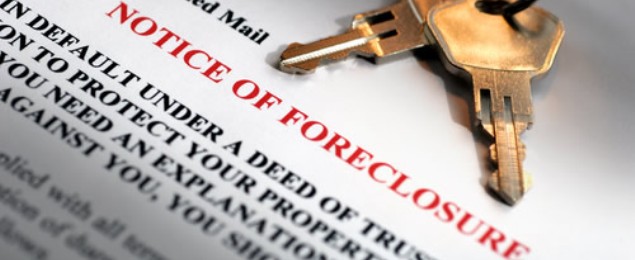

Find foreclosed homes for sale up to 60% below market value on our foreclosure listings

When it comes to foreclosures, there are a lot of gray areas. For example, what if your spouse has previously foreclosed upon a home and now you are married and you wish to buy a house under your credit score - is that possible? Or, what if you got married and then you faced foreclosure on a property with only your name on it - can your spouse apply for a home loan? There are many gray areas of the foreclosure process and this page aims to answer many of these complicated questions as simply as possible.
Most people understand that foreclosure is detrimental to their credit score for several years and results in a loss of their home, which is why many people try to avoid foreclosure. However, there are some situations where people actually consider a foreclosure when wondering how to buy a new house and seeking to escape their current mortgage payments without simply buying a second home (because that results in two mortgage payments instead of one).
If you are considering a strategic foreclosure, it is highly recommended that you consider your options carefully and that you thoroughly understand what a foreclosure means for you and your partner. When your home is foreclosed upon, you not only face a lower credit score, but home buying becomes a lot more difficult - as you will more than likely not be approved for a new home loan for approximately three years. Furthermore, the IRS considers the amount that was "forgiven" as taxable income; therefore, you and your spouse will more than likely have to pay taxes as a result of foreclosure.
Therefore, it is important for you to make sure that you really want to foreclosure upon your property before you make that decision. Instead of choosing foreclosure, you may wish to go down the home selling route and simply try to sell your home in order to fund your new real estate investing plan. If you are considering foreclosure, then remember that there are good reasons why those who are facing foreclosure (due to an inability to pay their mortgage payments as opposed to trying to obtain a new home) often chose to pursue a short sale instead of go through the foreclosure process - to avoid the negative effects of foreclosure. If you have an option to avoid foreclosure, then that is more than likely your best option.
More often than not it is cheaper to pay your loans and keep your current house (or sell your home legally) instead of undergoing the foreclosure process and attempting to purchase a new home. If your home is underwater, lenders may be willing to perform a loan modification that will help reduce your monthly mortgage payments. When you choose foreclosure, you not only suffer from bad credit (which often prevents you from buying a new home), but you also are often required to pay taxes on your debt forgiveness. At the end of the day, it is typically cheaper to keep your current home or sell it before purchasing a new home.
Sometimes a couple faces a situation where one spouse has undergone foreclosure and the other spouse's name was not on the foreclosed property's deed. In these situations, you may be wondering if your husband can purchase a home in his name only. The answer to this question is "it depends".
Overall, it depends on everything from state laws to the lender you are considering using for purchasing your new home. Some states will allow your husband to purchase a new home if you went through foreclosure before you were married, but not if the foreclosure occurred after you two were married. Similarly, some lenders require that both individuals be represented on the application (or at least their credit score is noted), while others may only request information from the borrower.
At the end of the day, you will have to ask the lender and learn more about your state's laws before you make any decisions. The answer to this situation greatly depends upon the specific situation and circumstances as well as the state in which you live as well as the lender you choose.
In short, no. Consider two homes to be separate accounts. One home may be foreclosed on, but the other home may be current - in which case, the bank will not take action against the current mortgage. From the bank's perspective, they are two separate loans with two separate contracts.
If, however, the second property is in any way connected to the first, such as using the home as collateral (something virtually no bank these days will do, but it is possible), the second property may be at risk.
For the vast majority of buyers, though, a bank cannot seize one home to pay off the other.
Foreclosures - especially strategic ones - can be complex and confusing. This problem is compounded when married couples engage in real estate transactions as individuals with separate credit scores and histories, particularly if foreclosure is involved or has been involved at some point during the process. Before proceeding with any transaction, always seek professional advice from your loan officer and a real estate attorney to make an informed decision.
